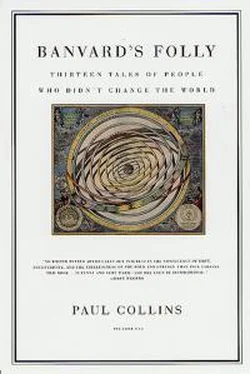Who?
Delia Bacon may be the most fatally doomed scholar ever to have set a pen to paper. She spent much of her life in poverty and illnesses both physical and mental, every book she published lost money, and her one great magnum opus goes unread even by her editors and biographers.
It is extraordinary that she published anything at all. Bacon was born in a log cabin on the Ohio frontier in 1811, a child of fervent poverty--her father, a missionary, gave everything in his failed attempt at establishing a school. He died when she was but six years old, and Delia's penniless mother had no choice but to farm out the children to kindhearted friends of the family. The Bacon children survived this ordeal to eventually rise to prominence--one grew up to become a crusading New York reporter, another an influential New Haven minister.
And then there was Delia. She landed quite fortuitously in the Hartford classroom of Catharine Beecher, the foremost advocate of young women's education of her time. Like her friend and classmate Harriet Beecher, Delia seemed marked out for achievement. Catharine Beecher later recalled that her
"homeless daughter of the Western missionary" was "preeminently one who would be pointed out as a genius; and one, too, so exuberant and unregulated as to demand constant pruning and restraint." Her exuberant genius had one great vulnerability, though--she had, Beecher said, "a morbid sensitivity to criticism."
Bacon proved to have many morbid sensitivities. Her health was always precarious; after leaving Beecher to start a girl's school with her sister, both were stricken with malaria. Delia continued lecturing until, near delirium, she collapsed before her students. Later on she would be nearly killed by an outbreak of cholera; between these near-fatal plagues, she would be struck down for days at a time by recurrences of her malaria and by violently painful migraine headaches.
Yet amid these ills, Bacon's intellect thrived. After her youthful attempt at running a school failed, she moved back to New Haven at the age of nineteen.
There she focused on her writing, and one year later had her first publication, the 1831 short story collection Tales of the Puritans. Soon afterward, the Philadelphia Saturday Courier awarded her $100 for her short story "Love's Martyour." It was a substantial sum of money, and her competitors were no slouches--for unknown to Delia, her closest challenger was a little-known Baltimore writer named Edgar Allan Poe.
Bacon spent her twenties teaching private classes to young women in New Haven and then in Manhattan in history, literature, and science. The erudite Bacon crossed disciplinary lines with ease, using each subject to illuminate the other. Her classes were a marvel of progressive education: no exams or textbooks, just lectures followed by intensive reading by each student in whatever field had caught her fancy. This method of research, of pursuing a single question to its utmost limit, was more than just how Bacon conducted learning; it was how she conducted her life.
While in New York, she grew close to Samuel Morse, an eccentric young artist.
He earned his living teaching art at NYU, but in his off-hours he pursued a fascination with ciphers, particularly with how they could be applied to that newest marvel of modern life: the telegraph. And codes were a venerable field, Morse pointed out to Bacon--after all, even Francis Bacon had invented a cipher for use in his career as a diplomat. This curious fact occupied her mind long after she left Manhattan.
Life in Manhattan spurred her to try her hand at publishing once again. Her next book was published in 1839, The Bride of Fort Edward. It was a closet drama, a play not actually meant for stage. Closet dramas are a hard sell even for an established playwright, and so only 692 copies sold, leaving Bacon stuck with a bill for the 808 remainders. This was a common fate for authors of the time; Thoreau once grimly joked that he owned a large library, the majority of which was composed of unsold copies of his first book. But this was little consolation to Bacon: when she left the city in 1840, it was uncertain whether she could ever earn money as a writer.
Bacon spent the next decade traveling the country, becoming caught up in a scandalous ecclesiastical trial, and above all engaged in constant learning.
By the time she rose to the Boston lecture circuit in 1850, she was at the top of her form, and the city's female intelligentsia packed her lectures over the next two years. It was an uncanny experience for some: the brilliant Transcendentalist philosopher Margaret Fuller had just drowned in a shipwreck a few months before, and this woman onstage seemed to be her living reincarnation.
Her audiences were indulgent of her brilliance; so what if she occasionally strayed from lectures on Restoration monarchy or ancient Greece to suddenly focus intensely on the plays of Shakespeare, and on how such sophisticated literature could not possibly have been written by some fourth-rate actor? She was, in fact, convinced that this so-called Shakespeare was nothing but a front for a collaborative effort by Walter Raleigh, Edmund Spenser, and Francis Bacon, and that the plays were a cipher for a political philosophy that, if stated plainly, might have landed the real authors in the Tower of London.
Her friends worried, though. They had already watched her try in 1845 to pitch her brazen theory to the publisher Wiley and Putnam, only to have it fall flat with a heavy thud. Bacon's fixation on the Shakespeare imposture was so embarrassingly unconventional that friends would change the subject whenever she brought it up. One, hoping to keep her friend from becoming agitated, would hide all her copies of Shakespeare before Bacon came to visit.
But one new acquaintance, Elizabeth Peabody, was delighted. It would not be unfair to say that nineteenth-century American literature can be mapped out as Six Degrees of Elizabeth Peabody. First she wrote to her brother-in-law--Nathaniel Hawthorne, conveniently enough--and asked him to look over Bacon's theories. Hawthorne politely declined. Peabody had better success, though, with another good friend--Ralph Waldo Emerson. Emerson had
read deeply in Shakespeare and his contemporaries, and Bacon's theory struck him as a brilliant answer to the nagging question of how a mere actor could have written the world's greatest works of literature.
"So radical a revolution should be proclaimed with great compression in the declaration," he advised in his first letter to her, in June 1852, "and the real grounds rapidly set forth, a good ground in each chapter, and preliminary generalities quite omitted. For there is an immense presumption against us which is to be annihilated by battery as fast as possible."
It was good advice--hit hard and fast, and let some later work deal with the niceties and the details. Bacon assured him that she was already in a position to deal some knockout blows: "Confirmations of my theory, which I did not expect to find on this side of the water, have turned up since my last communication to you, in the course of my researches in the libraries here and in Boston." Writing again to him a few weeks later, she coolly announced, "Be assured, dear sir, there is no possibility of a doubt as to the main points of my theory."
But Bacon knew that she would need extensive historical documentation to back up her claims, and there were only two places where she could find the original documents: London and Stratford-on-Avon. After finishing up a final round of lectures on Hindu scriptures, Persian poetry, and Egyptology, she paid a visit to Manhattan banker Charles Butler. He was a well-known intellectual benefactor, having already saved NYU from insolvency and then created its law school. And Bacon was at the top of her form as a public intellectual; in addition to Emerson, a slew of prominent intellectuals like Washington Irving, George Ripley, William Thackeray, and dashing Arctic explorer Elisha Kent Kane had all attested to her intellectual prowess as a lecturer. Butler was suitably impressed, and bankrolled her trip to England for an entire year.
Читать дальше











